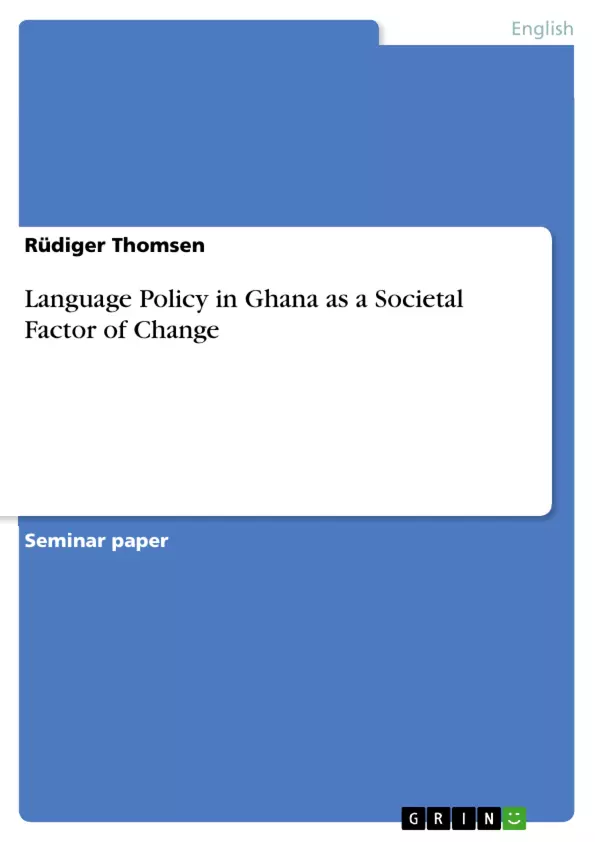This term paper gives a concise understanding of language policy in Ghana. The West African region has recently suffered from a number of serious problems. The horrendous outbreak of the Ebola virus has affected countries like Mali, Guinea, Liberia and Sierra Leone. According to the WHO, the official death toll in the region has already exceeded an alarming 5,160 people out of more than 14,000 Ebola cases by mid-November 2014. Although Nigeria's recent declaration of being Ebola free has given some hope, the upcoming elections are overshadowed by terrorist attacks of the Boko Haram group. Burkina Faso's military coup beginning of November led to an interim government; uncertainties still remain whether the county will find its way back to civilian rule.
Against the above-mentioned issues of health and political instability, language and education may indeed seem fairly irrelevant. Still, if we consider the more general socio-cultural dimension of a positive transformation of the African region, language is an important factor in the process. Accordingly, Bernard Spolsky emphasizes the importance of language policy as one of the new major topics in dealing with a society's situation.
Inhaltsverzeichnis (Table of Contents)
- Introduction
- A Theoretical Background: Defining Language Policy
- The Case of Ghana
- The Language Situation in Ghana
- A Brief History of Education in Ghana: From Non-formal Education to Language Policy
- The Education System of Ghana and the 2002 Language Policy
- Challenging the Language Policy: A Theoretical Background on Bilingualism
- Alternative Suggestion: Late Exit/Gradual Transition Model
- Conclusion
Zielsetzung und Themenschwerpunkte (Objectives and Key Themes)
This paper aims to critically investigate language policy in Ghana. The objectives are to define different levels and the scope of language policy in more general terms before examining the Ghanaian case specifically. The historical background of education in Ghana will serve as a context for the current language policy. The arguments used to support the policy will be presented, followed by counterarguments and issues. The paper will then explore a theoretical background of bilingualism and consider alternative suggestions.
- Defining the concept of language policy and its various domains
- Analyzing the language situation in Ghana, including the diversity of indigenous languages and the role of English as the official language
- Examining the history of education in Ghana and its influence on language policy
- Evaluating the current language policy in Ghana, focusing on the use of English as the medium of instruction
- Exploring theoretical frameworks on bilingualism and suggesting alternative models for language policy implementation
Zusammenfassung der Kapitel (Chapter Summaries)
- Introduction: This chapter sets the scene by discussing the challenges facing West Africa, including the Ebola outbreak and political instability. It introduces Ghana as a successful development model and highlights the role of language in social and cultural transformation. The chapter outlines the scope and objectives of the paper, which is to critically investigate language policy in Ghana.
- A Theoretical Background: Defining Language Policy: This chapter defines the concept of "language policy" and its various domains, including language practices, beliefs, and planning. It draws on the work of Bernard Spolsky to illustrate how language policy can operate at different levels, from individual decisions to government policies.
- The Language Situation in Ghana: This chapter presents a detailed overview of the diverse language situation in Ghana, outlining the numerous indigenous languages and the role of English as the official language. The chapter also discusses the influence of migration and other non-native languages on the linguistic landscape of Ghana.
- A Brief History of Education in Ghana: From Non-formal Education to Language Policy: This chapter examines the evolution of education in Ghana, highlighting the shift from traditional non-formal education to colonial and post-colonial policies. It explores the role of missionaries, castle schools, and the British colonial influence in shaping the language of education in Ghana.
Schlüsselwörter (Keywords)
The key terms and focus topics of this paper include language policy, education in Ghana, bilingualism, English as a medium of instruction, indigenous languages, language diversity, and language planning.
- Quote paper
- Rüdiger Thomsen (Author), 2015, Language Policy in Ghana as a Societal Factor of Change, Munich, GRIN Verlag, https://www.hausarbeiten.de/document/1153721


